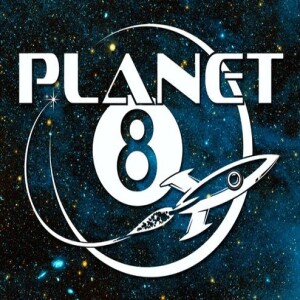
On this edition of Planet 8, we take a look at the master of suspense, Alfred Hitchcock. Spanning six decades, Hitchcock's career began near the end of silent films all the way into the 70s, and encompassed television as well. He was probably the first film director that the general public recognized, due to his larger than life personality and his consistent use of suspense and fear in his films. Hitchcock would push the envelope with both camera techniques and with how far he would push the mores of the day.
We'll discuss a number of his films, including Rope and the illusion of the single camera take. Also Rear Window, and the amazing set that was constructed of Jimmy Stewart's neighborhood, and the sense of claustrophobia that was created. There's also To Catch a Thief, which Bob sees a precursor to the Bond films. This time Hitchcock went on location and we get wide open vistas.
Then there's Vertigo, which many believe is Hitchcock's masterpiece. The crew had some disagreement over whether Jimmy Stewart's character suspected that Kim Novak's character was actually his old flame or not. If he did know, it would make his obsessive behavior a little easier to take. But watch it and decide for yourself.
North By Northwest is another favorite for many, with Cary Grant as a man in the wrong place at the wrong time. It's got great actors, humor, and Mount Rushmore too!
But in 1960, Hitchcock delivered what might be his best-known, and perhaps most shocking film, Psycho. Based on a story by Robert Bloch, this tale of murder and a boy who loves his mother a little too much was a hit with the public when released. We talk about the film and especially the Bernard Herrmann score. Herrmann worked with Hitchcock on many of his films, but this score is especially memorable.
And who could forget The Birds? This film has an almost apocalyptic feel, as ordinary birds suddenly begin attacking people. Shot in Bodega Bay, California, the beautiful, peaceful landscapes are juxtaposed with the chaos of the birds' violent and inexplicable attacks. It's an amazingly effective film, which has no music, only bird sounds in the soundtrack. And no happy ending -it's ambiguous as to whether the menace is over. There's also some classic shots in this film, like when a huge flock of birds slowly appear behind Tippi Hedren, or the birds-eye view shot of the town and the gas station on fire. It's great work by the master.
There are so many other great films by Hitchcock -Strangers on a Train, Frenzy, The Man Who Knew Too Much - but we only have so much time. Do yourself a favor and check them out! We wish we had time to go over the television show, Alfred Hitchcock Presents, but that will have to be saved for another episode!
For this week's Sensor Sweep, Karen shares something completely non-Hitchcock related! Who says we have to make everything match? We're back to Star Wars! It's a great new book called Secrets of the Force: The Complete, Uncensored, Unauthorized, Oral History of Star Wars by Edward Gross and Mark A. Altman. This huge tome covers the entire history of the Star Wars films as told by the people who made the films and others who are affiliated with them. These authors have previously done some terrific books on the oral history of Star Trek that were just a joy to read. If you are a Star Wars fan and want to delve deep into the behind the scenes history, this is the book for you!
That's it for us this time around! Please let us know your thoughts on anything we discussed this episode. You can leave comments here, or hit us up and our other haunts:
- Twitter: https://twitter.com/Planet8Cast
- Facebook: www.Facebook.com/Planet8Podcast








No comments yet. Be the first to say something!